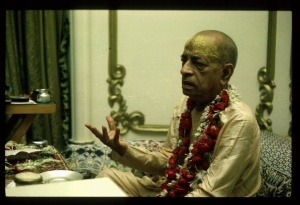SB 3.26.14

A.C. Bhaktivedanta Swami Prabhupada
TEXT 14
- mano buddhir ahaṅkāraś
- cittam ity antar-ātmakam
- caturdhā lakṣyate bhedo
- vṛttyā lakṣaṇa-rūpayā
SYNONYMS
manaḥ — the mind; buddhiḥ — intelligence; ahaṅkāraḥ — ego; cittam — consciousness; iti — thus; antaḥ-ātmakam — the internal, subtle senses; catuḥ-dhā — having four aspects; lakṣyate — is observed; bhedaḥ — the distinction; vṛttyā — by their functions; lakṣaṇa-rūpayā — representing different characteristics.
TRANSLATION
The internal, subtle senses are experienced as having four aspects, in the shape of mind, intelligence, ego and contaminated consciousness. Distinctions between them can be made only by different functions, since they represent different characteristics.
PURPORT
The four internal senses, or subtle senses, described herein are defined by different characteristics. When pure consciousness is polluted by material contamination and when identification with the body becomes prominent, one is said to be situated under false ego. Consciousness is the function of the soul, and therefore behind consciousness there is soul. Consciousness polluted by material contamination is called ahaṅkāra.